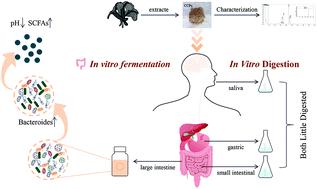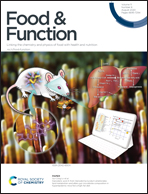Effects of in vitro digestion and fecal fermentation on the stability and metabolic behavior of polysaccharides from Craterellus cornucopioides†
Abstract
The present study aimed to investigate the digestion and fermentation behavior of a novel polysaccharide named CCP from Craterellus cornucopioides. Results revealed that in vitro digestion could significantly decrease the molecular weight of CCPs. However, only a small amount of free glucose monosaccharide was released, and there was no noticeable change in the antioxidant activity throughout this digestion period, demonstrating that the main structure of CCPs was relatively stable under the simulated digestive conditions. The content of reducing sugar (1.11 mg mL−1) was significantly increased by fermentation in vitro of gut microbiota. The pH value in the fecal culture significantly decreased to 6.68, suggesting that CCPs could be broken down and utilized by gut microbiota. The concentrations of total short-chain fatty acids, acetic, propionic and n-butyric acids significantly increased compared to the blank. Simultaneously, CCPs could remarkably modulate the composition and abundance of beneficial microbiota, especially Bacteroidetes. Therefore, CCPs could potentially be a functional food to prevent disease by promoting gut health.



 Please wait while we load your content...
Please wait while we load your content...